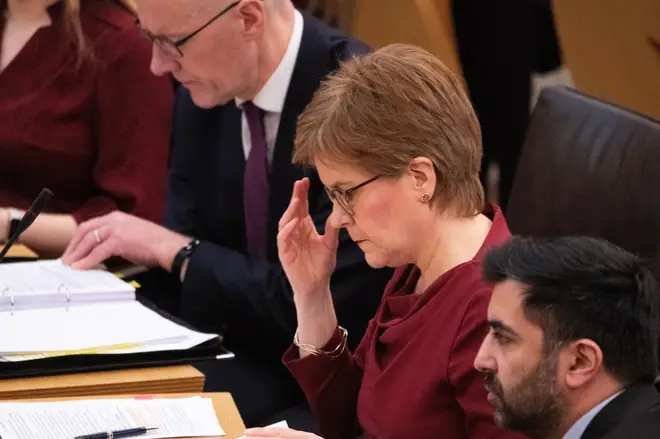
Nick Abbot 10pm - 1am
9 December 2022, 17:30

Is Nicola Sturgeon losing her grip on her SNP MPs? And if she is, what does it mean for her own position as party leader?
Those are the questions keeping the Holyrood rumour mill going since the Aberdeen South MP, Stephen Flynn, won the support of 26 of the 44-strong MP group in Westminster on Tuesday night.
He was not the automatic choice of Scotland’s First Minister to replace Ian Blackford, who had made a sudden decision to resign from the job the previous week - not that there was a coup, or heaven forfend, any division within the SNP ranks. Don't suggest such a thing of Stewart Hosie will spit out his coffee.
Instead it was Alison Thewliss, the other option on the ballot, who was backed by Nicola Sturgeon. A loyalist to the party leader, like Blackford, she was seen as the continuity candidate.
But she lost. And, to many, that means so did Nicola Sturgeon.
Flynn, it is understood, is like many SNP MPs, unhappy with much of what goes on in Holyrood and his party’s domestic record. The co-operation agreement his boss struck with the Scottish Greens also didn’t go down well with him, given many of his constituents work in the oil and gas industries. And he is also believed to have been dismayed at the decision to go to the Supreme Court to test the competence of the Scottish Parliament to hold a second independence referendum - rather than get a Bill through Holyrood first - leaving all the SNP MPs fretting about just how a defacto referendum at a General Election will work.
Publicly of course he and Nicola Sturgeon get along fine, and there was much congratulation after his victory. But any idea that his election might stop the splits, might unite the Westminster group in a way Blackford had been unable to in recent times, is already dead in the water.
In fact it was a goner when Flynn decided he wanted Mhairi Black as his deputy. The Paisley MP is seen as a divisive character in the group - and indeed that decision is believed to have lost Flynn some votes (not that it mattered in the end).
Then he sacked the well-liked Owen Thompson as the party’s Westminster whip and replaced him with Martin Docherty-Hughes, which put a number of noses out of joint within the so-called Tuesday Club of SNP MPs (they play football and go for a curry every week), who had worked to install Flynn as leader.
Docherty-Hughes was at one time very close to Blackford and is seen as being loyal to Nicola Sturgeon. It has left some scratching their heads at Flynn’s strategy, and there has yet to be any announcement from the party on what his frontbench team will look like.
Some decisions have been taken out of his hands. Around 24 hours after the AGM, Pete Wishart, the longest serving SNP MP, quit his frontbench role. He made his reasons for doing so very public, tweeting his resignation letter in which he said he was “bemused” by the need to replace Blackford and questioning Flynn’s canvassing of support for weeks prior to the AGM.
A few hours later Stewart McDonald, the party’s defence spokesman for the last five years also resigned his position. And by Thursday night Chris Law had stood down from his role as lead on international development.
All three MPs are known to be supporters of Blackford, and again very loyal to Nicola Sturgeon. One SNP MP told me they were just angry at being outmanouevered and had "thrown their toys out the pram".
Did they go before Flynn asked them to? Possibly, but the manner of their going has left the divisions wide open for all to see.
So is Nicola Sturgeon losing her grip? Is her jacket on a shoogly peg in Bute House? Well, yes - and no.
Despite the deep concerns in the party - being shown now at Westminster too - about the First Minister’s plans to achieve independence, she remains unassailable as leader of the SNP. There is no-one who could challenge her - at the moment. And any challenge would have to come from Holyrood rather than Westminster.
But Flynn’s election puts down a marker. As did the remarkable backbench rebellion in Holyrood over the Gender Recognition Reform Bill. Then there are SNP MSPs seriously questioning the financial rationale of the flagship National Care Service legislation. These things just do not normally happen on the good ship SNP where everyone rows in unison to the beat of Nicola Sturgeon’s drum.
A weakness has been sensed by ambitious up-and-comers like Flynn and Ash Regan, who resigned her government post over gender reform. It’s also perhaps been sensed by old timers who know they will never be invited to the Cabinet, like MSPs Kenny Gibson and Michelle Thomson. Ironically it’s in the air despite the poll this week showing a rise in support for independence in the wake of that Supreme Court judgement.
For the moment Nicola Sturgeon and Stephen Flynn will be seen to get along, be seen to be working together with the same aim. But a General Election is a long way away yet, and it can be hard to keep up appearances. A lot now rests on the special party conference in March and whether the members - and elected politicians - are happy with just what is decided over how to turn an election on the next UK government into a referendum on independence.
It will be a make or break moment for the party.